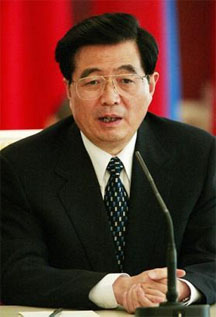WASHINGTON, (Reuters) – U.S. lawmakers pressed Chinese President Hu Jintao to get tough on North Korea and improve human rights yesterday but trod more softly on the currency dispute that is a major irritant between the world’s top two economies.

Hu was urged by President Barack Obama on Wednesday to let the value of China’s currency rise but members of Congress zeroed in on human rights and trade to underscore the huge gaps between Beijing and Washington.
“Chinese leaders have a responsibility to do better and the United States has a responsibility to hold them to account,” John Boehner, the new Republican speaker of the House of Representatives, said after meeting Hu with other lawmakers.
Analysts have called Hu’s visit to Washington the most significant by a Chinese leader in 30 years given China’s growing military and diplomatic clout.
But it comes at a time of strains over everything from economic policy and climate change to the nuclear ambitions of North Korea and Iran.
Lawmakers said they urged Hu to take a stronger line on North Korea, hoping to use Beijing’s influence over Pyongyang to ease tensions on the Korean peninsula and resume aid-for-disarmament talks.
After a series of business deals were announced this week, Hu continued his courtship of U.S. companies with a speech describing the benefits of cooperation before he was due to travel to Chicago yesterday afternoon. More deals are expected to be announced there.
Underlining China’s importance to the global economy, data yesterday showed its annual growth quickened in the fourth quarter of last year to 9.8 percent, defying expectations of a slowdown.
As U.S. voter anger simmers with unemployment riding above 9 percent, lawmakers have threatened new tariffs to punish Beijing for policies that critics say undervalue the yuan by up to 40 percent against the dollar.
The policies make China’s exports artificially cheap, the critics charge, and contribute to a trade gap that Washington puts at $270 billion.
While House lawmakers skipped the currency question, which has been raised more frequently in the past by Democrats than Republicans, Senate Majority leader Harry Reid did raise it in his meeting with Hu, an aide said. And the U.S. Treasury kept up the pressure with Assistant Treasury Secretary Charles Collyns saying Beijing has kept the yuan “substantially undervalued.”
Obama had spoken forcefully about the yuan in a joint news conference with Hu on Wednesday but the comments by Collyns were the sharpest direct criticism of China’s currency policies during Hu’s visit.




